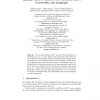Free Online Productivity Tools
i2Speak
i2Symbol
i2OCR
iTex2Img
iWeb2Print
iWeb2Shot
i2Type
iPdf2Split
iPdf2Merge
i2Bopomofo
i2Arabic
i2Style
i2Image
i2PDF
iLatex2Rtf
Sci2ools
123
click to vote
NC
2008
2008
Spiking neural P systems with extended rules: universality and languages
We consider spiking neural P systems with rules allowed to introduce zero, one, or more spikes at the same time. The motivation comes both from constructing small universal systems and from generating strings; previous results from these areas are briefly recalled. Then, the computing power of the obtained systems is investigated, when considering them as number generating and as language generating devices. In the first case, a simpler proof of universality is obtained, while in the latter case we find characterizations of finite and recursively enumerable languages (without using any squeezing mechanism, as it was necessary in the case of standard rules). The relationships with regular languages are also investigated.
| Added | 14 Dec 2010 |
| Updated | 14 Dec 2010 |
| Type | Journal |
| Year | 2008 |
| Where | NC |
| Authors | Haiming Chen, Mihai Ionescu, Tseren-Onolt Ishdorj, Andrei Paun, Gheorghe Paun, Mario J. Pérez-Jiménez |
Comments (0)

